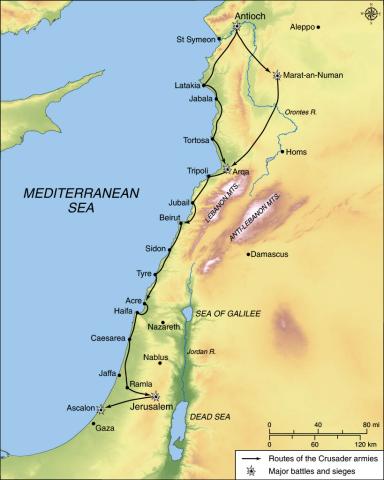The Road to Jerusalem
[10.34.5] Summō autem dīlūculō collēgērunt nostrī suōs pāpiliōnēs, et vēnērunt obsidere idem castrum, ibique putābant extendere tentōria; sed genus pāgāna omnīnō dēdit sēsē fugae, ac dīmīsērunt castrum vacuum. Intrantēs autem, nostrī invēnērunt ibi omnem abundantiam frūmentī, vīnī, farīnae, oleī, et quicquid eīs opus erat. Illīc dēvōtissimē celebrāvimus fēstīvitātem Pūrificātiōnis Sānctae Mariae, vēnēruntque illīc nūntiī dē Camēlā cīvitāte. Rēx namque illīus mandāvit comitī equōs, aurum, et pactus est cum eō quod Chrīstiānōs nūllōmodō offenderet, sed eōs dīligeret et honōrāret. Rēx autem Tripolis mandāvit comitī quoniam cum eō fidēliter pactum inīret et amīcitiam habēret, sī eī placēret, mīsitque illī equōs decem et quāttuor mūlās et aurum. Sed comes ait nūllōmodō cum eō pācem sē recipere, nisi ille Chrīstiānus efficerētur.
notes
(January–February 1099) The crusaders prepare to besiege the castle (fortified village) but find that the inhabitants have fled. Messengers come from Camela (modern Homs), with promises not harm the crusaders. An offer of peace also arrives from the leader of Tripoli, but Raymond of Toulouse insists that he must become a Christian.
extendere tentōria: “to encamp” (and thus besiege).
fēstīvitātem Pūrificātiōnis Sānctae Mariae: Candlemas, February 2, 1099; the celebration of the presentation of Jesus at the Temple (Luke 2:22–40).
dē Camēlā cīvitāte: the modern Syrian city of Homs; the crusaders for unkmown reasons called the place "She-camel."
Rēx ... illīus: his name was Jana al-Dawla, and his title was atabek; he was subject to Rudwan of Aleppo.
Rēx autem Tripolis: his name was Fakhr al-Malik ibn Ammar; he was quazi of Tripoli, an independent principality in what is now northern Lebanon.
vocabulary
diluculum –ī, n.: daybreak, dawn.
pāpiliō –ōnis, m.: butterfly, ghost (CL); tent, pavilion (ML)
obsideō obsidēre obsēdī obsessum: to besiege
farīna –ae, f.: flour, meal

